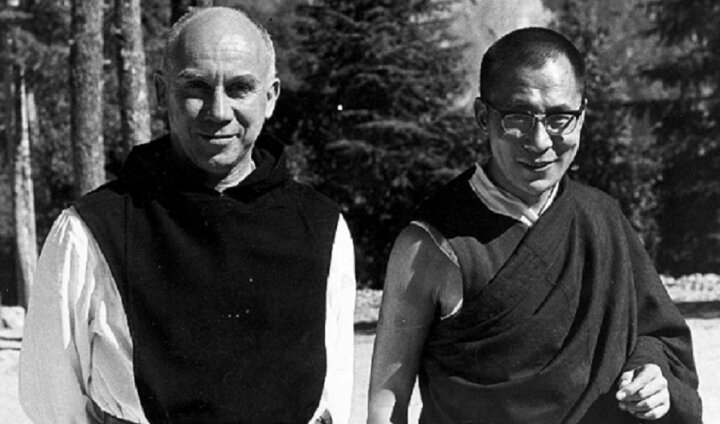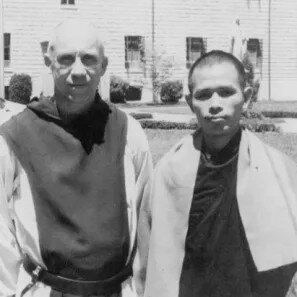Thomas Merton
I have quite a lot of time for Thomas Merton, or Father Louis as he was known in his monastery - when he was there of course and not gallivanting about, having clandestine meetings with various worthies of diverse Faiths. Escaping under the Church radar.
Merton was rarely didactic in his writings, even in his published books. But it is in his Letters and Journals that a true light shines.
As he wrote in an introduction to a collection of his writings:-
I have tried to learn in my writing a monastic lesson I could probably have not learned otherwise: to let go of my idea of myself, to take myself with more than one grain of salt................In religious terms, this is simply a matter of accepting life, and everything in life as a gift, and clinging to none of it, as far as you are able. You give some of it to others, if you can. Yet one should be able to share things with others without bothering too much about how they like it, either, or how they accept it. Assume they will accept it, if they need it. And if they don't need it, why should they accept it? That is their business. Let me accept what is mine and give them all their share, and go my way.
All life tends to grow like this, in mystery inscaped with paradox and contradiction, yet centered in its very heart, on the divine mercy..........
Or as Robbie Robertson says in his great song "The Night They Drove Old Dixie Down":- Just take what you need and leave the rest. (The only downside of this is the implications contained in the next line:- "But they should never have taken the very best". How do we ever know what is the "best"? A conundrum, and perhaps the heart of true Faith.)
But back to Father Louis, and to perhaps begin a few selections from his writings, here he is in a letter written to one correspondent, back in 1958 I believe:-
I hate proselytizing. This awful buisness of making others just like oneself so that one is thereby "justified" and under no obligation to change himself. What a terrible thing this can be. The source of how many sicknesses in the world. The true Christian apostolate is nothing of this sort, a fact that Christians themselves have largely forgotten. I think it was......Tauler (or maybe Eckhart) who said in a sermon that even if the church were empty he would preach the sermon to the four walls because he had to. That is the true apostolic spirit, based not on the desire to make others conform, but in the desire to proclaim and announce the good tidings of God's infinite love. In this context the preacher is not a "converter" but merely a herald, a voice, and the Spirit of the Lord is left free to act as He pleases. But this has degenerated into a doctrine and fashion of "convert-makers" in which man exerts pressure and techniques (this awful business of "modern techniques of propaganda") upon his fellow man in order to make him, force him, bring him under a kind of charm that compels him to abandon his own integrity and his own freedom and yield to another man or another institution. Little do men realize that in such a situation the Holy Spirit is silent and inactive, or perhaps active against the insolence of man. Hence the multitude of honest and sincere men who "cannot accept" a message that is preached without respect for the Spirit of God or for the spirit of man.
As you can see, Merton never learnt the art of PC, so called gender inclusive language. Not sure whether that is good or bad.....😀
Well, that is it for now.
Have a good day.
Merton was rarely didactic in his writings, even in his published books. But it is in his Letters and Journals that a true light shines.
As he wrote in an introduction to a collection of his writings:-
I have tried to learn in my writing a monastic lesson I could probably have not learned otherwise: to let go of my idea of myself, to take myself with more than one grain of salt................In religious terms, this is simply a matter of accepting life, and everything in life as a gift, and clinging to none of it, as far as you are able. You give some of it to others, if you can. Yet one should be able to share things with others without bothering too much about how they like it, either, or how they accept it. Assume they will accept it, if they need it. And if they don't need it, why should they accept it? That is their business. Let me accept what is mine and give them all their share, and go my way.
All life tends to grow like this, in mystery inscaped with paradox and contradiction, yet centered in its very heart, on the divine mercy..........
Or as Robbie Robertson says in his great song "The Night They Drove Old Dixie Down":- Just take what you need and leave the rest. (The only downside of this is the implications contained in the next line:- "But they should never have taken the very best". How do we ever know what is the "best"? A conundrum, and perhaps the heart of true Faith.)
But back to Father Louis, and to perhaps begin a few selections from his writings, here he is in a letter written to one correspondent, back in 1958 I believe:-
I hate proselytizing. This awful buisness of making others just like oneself so that one is thereby "justified" and under no obligation to change himself. What a terrible thing this can be. The source of how many sicknesses in the world. The true Christian apostolate is nothing of this sort, a fact that Christians themselves have largely forgotten. I think it was......Tauler (or maybe Eckhart) who said in a sermon that even if the church were empty he would preach the sermon to the four walls because he had to. That is the true apostolic spirit, based not on the desire to make others conform, but in the desire to proclaim and announce the good tidings of God's infinite love. In this context the preacher is not a "converter" but merely a herald, a voice, and the Spirit of the Lord is left free to act as He pleases. But this has degenerated into a doctrine and fashion of "convert-makers" in which man exerts pressure and techniques (this awful business of "modern techniques of propaganda") upon his fellow man in order to make him, force him, bring him under a kind of charm that compels him to abandon his own integrity and his own freedom and yield to another man or another institution. Little do men realize that in such a situation the Holy Spirit is silent and inactive, or perhaps active against the insolence of man. Hence the multitude of honest and sincere men who "cannot accept" a message that is preached without respect for the Spirit of God or for the spirit of man.
As you can see, Merton never learnt the art of PC, so called gender inclusive language. Not sure whether that is good or bad.....😀
Well, that is it for now.
Have a good day.






